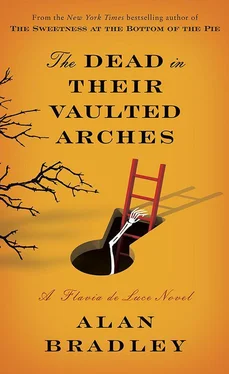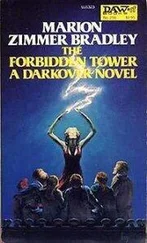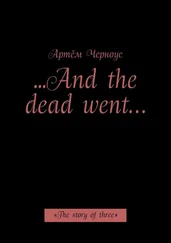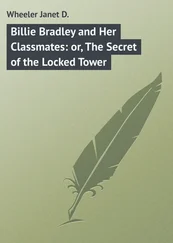So round the room I went, stamping four-legged impressions with the stool’s legs everywhere, and making sure to leave as many footprints as I could manage.
When I had finished, Angels looked like a ballroom in which the Dance of the Chimney Sweeps had been held.
I was proud of myself.
I had made it halfway back along the hall, stool in hand, when a voice said, “What are you doing, Flavia?”
It was Undine. She was standing in a little nook where breakfast tea trays had once been prepared, and I hadn’t seen her until she’d already spotted me.
“How long have you been there?” I demanded. “Does your mother know you’re prowling round in the middle of the night?”
“It isn’t the middle of the night,” she corrected me. “It’s morning, and Ibu has already been up for hours. Besides, that’s two questions, and Ibu always says:
“Riddle me no more than once
“Unless you wish to be the dunce.”
I could cheerfully have strangled Ibu—and her daughter—with the nearest pair of nutcrackers, but I controlled myself.
“Ibu says today is your mother’s funeral and that we mustn’t mention it because it might cause you deep distress.”
“Ibu’s very considerate”—I smiled—“and you may tell her I said so.”
I had hopeful visions of Undine parroting my words to Lena and receiving a sound thrashing for her troubles.
“What are you doing with the stool?” Undine asked.
“Watering plants,” I replied, almost without thinking about it. I had become a deft liar when required—and sometimes not.
“Ha!” Undine said, planting her hands on her hips. But she left it at that.
“Run along now,” I told her, surprised at the great pleasure I took in doing so. “I’ve got work to do.”
Which was no more than the truth. I had gone to the library to ferret out the meaning of the stranger’s message, only to be distracted by Daffy’s news about the unexpected arrival of Adam Sowerby.
“He and Father are old friends,” Daffy had reminded me. It was true, but why was Adam suddenly here? And why now? Had he come as a friend of the family to pay his respects to Harriet, or was he here in his role of inquiry agent?
These were things I needed to know.
But first—a return to the library.
As I had hoped it might be, the library was now in darkness. Daffy must have gone to bed soon after I left her, because Paradise Lost was still lying open, facedown, in the same position I had last seen it—which was a sure indication of my sister’s state of mind.
If I had left a book lying open on its face like that, she’d have flung it into my face, along with a fiery lecture on what she always referred to as “respect for the printed word.”
I knew well enough what a gamekeeper was, since there had once been one at Buckshaw, although that was long before my time, of course. Much more recently, Daffy had read to us selected passages from Lady Chatterley’s Lover , which was interesting if you were keen on country houses but far too full of gush and mush if you were not.
I switched on a small table lamp and went directly to the Oxford English Dictionary , “The Holy of Holies,” as Daffy called it: twelve volumes plus supplement. The Ns were in the seventh volume. I lifted it down, opened it in my lap, and ran my finger down the page:
Nictation … Niddering … Niddicock—
Aha! So that was where Daffy had dredged up the word.
“Flavia, you dim-witted niddicock,” she was fond of saying.
Daffy is the only person I know who mines the Oxford English Dictionary for insults in the same way others dig for diamonds.
Ah, here it was:
Nide(nəid), sb. [ad. F. nid or L. nid-us : the older F. ni is represented by Nye. Cf. Nid.] A brood or nest of pheasants.
My blood was instantly ice water.
Pheasants! A nest of pheasants!
“Pheasant sandwiches!” Harriet’s words on the ciné film.
“And have you, also, acquired a taste for pheasant sandwiches, young lady?” Mr. Churchill’s words at Buckshaw Halt.
But what did they mean?
My brain was crawling with words, with images, and with half-formed ideas.
I knew suddenly that I needed to get away from this house of perpetual gloom, get away to somewhere I could think new thoughts—my own thoughts, rather than the worn-out thoughts of others.
I would pack a breakfast-lunch.
Where would I go? I didn’t know.
The dovecote at Culverhouse Farm, perhaps. The dusty tower, silent save for the cooing of the doves, was a tempting hideout. Even a couple of hours away would give me time to think without having to worry about bargers.
I’d be back in plenty of time to get dressed for the funeral.
TWENTY-ONE
MRS. MULLET JERKED AWAKE as I opened the kitchen door. I could tell by her eyes that she had been crying.
“Mrs. M. What are you doing here?”
Her head was still half raised from where it had been cradled in her arms on the kitchen table. She looked as if she didn’t know where she was.
“No, don’t get up,” I told her. “I’ll put the kettle on and make you a nice cup of tea.”
Less than five seconds in the room and I was already taking charge of a woman in distress. How very, very odd.
I patted her shoulder like mad, and surprisingly, she let me.
“You’ve been here all night, haven’t you?”
Mrs. M nodded and pressed her lips tightly together until they were white.
“It’s too much for you,” I told her. “You’ve been working too hard. Daffy told me Adam Sowerby arrived last night. I’ll knock him up and have him run you home.”
“ ’E’s gone already, love. Hours ago.”
Adam gone already? It didn’t make sense. Why, he’d only just arrived.
I dawdled over the sink, taking my time with the kettle, waiting for the water to run cold to allow Mrs. Mullet time to wipe her eyes and poke in the ends of her hair.
“You’ve been overdoing it, Mrs. M,” I said. “You must be exhausted. Why don’t you go up to my room and have a nap? No one will disturb you there.”
“Workin’ too ’ard?” Her voice was suddenly battleship steel. “That’s where you’re wrong, Miss Flavia. I ’aven’t been workin’ ’ard enough. That’s the trouble.”
I put the kettle on the stove and waited for her to subside, but she didn’t.
“There’s work to be done and it’s my place to do it.”
“But—”
“Don’t but me, miss. ’Tisn’t every day Miss ’Arriet comes ’ome, an’ ’tisn’t every day I gets to welcome ’er. No one shall take that away from me—
“Not even you, Miss Flavia.”
I went to her and put my arms around her from behind, resting my cheek on top of her head.
I didn’t say a word because I didn’t need to.
Outside, seen from the kitchen garden, one of the larger planets—Jupiter, I think—was well up above the pink ribbon of the eastern horizon.
It was the dark of the moon, and overhead, the stars sparkled in the inky blue-black vault of the heavens.
I was wiping the dew from Gladys’s cold seat when something rustled near the greenhouse.
“Dogger?” I called quietly.
There was no reply.
“Adam?
“All right,” I said. “I know you’re there. Come out before I call the police.”
Someone stepped out of the shadows.
It was Tristram Tallis.
“Sorry,” he said. “I didn’t mean to frighten you. I was trying not to wake the household.”
“You didn’t frighten me,” I told him. “I thought you were a prowler. You’re lucky I didn’t shoot you.”
Читать дальше












